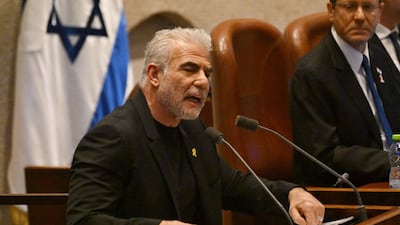Prime Minister Benjamin Netanyahu’s opponents are co-ordinating efforts to bring the coalition government down within months, the leader of Israel’s opposition said on Wednesday.
Yair Lapid, the leader of the centrist Yesh Atid party, said a recent meeting had focused on a campaign to topple the government as early as the winter parliamentary session, which begins in two weeks after almost three months of recess. He said the aim was to form a coalition of “correction and healing in Israel”.
The opposition politicians, who included former prime minister Naftali Bennett, also called for the implementation of US President Donald Trump’s plan to release hostages and end the Gaza war. Talks on the proposal are currently taking place in Egypt, putting Israelis on tenterhooks for the prospect of release and repatriation of hostages living and dead.
A statement from the group stressed that they would offer Mr Netanyahu a “safety net” to get a hostage deal through, in the event that far-right parties abandon the coalition in opposition to ending the war. Mr Lapid described the initiative as “insurance [for Mr Netanyahu] against his extremist and irresponsible partners”.

Despite consistently bad polling numbers for the current coalition since the October 7 attacks, the opposition in Israel is often criticised for being unable to provide an inspiring alternative to Mr Netanyahu, who is by far the most successful politician in Israel’s history. There is no indication yet of who would lead such a coalition were one to come into power.
Over the course of the war, Mr Netanyahu has managed to claw back some points in the polls, but remains weak in the face of great anger over how he has managed the fate of Israeli hostages and for not taking responsibility for the October 7 attacks, the worst military disaster in the country’s history.
The group included right-wing opposition figures such as Mr Bennet, and Avigdor Lieberman of the Yisrael Beiteinu party, as well left-wing Zionist politician Yair Golan. No Palestinian-Israeli parties were listed.
At a similar meeting last month, attended by fewer opposition members, the parties agreed to establish a group to start working on the priorities of a future administration.
Leading issues included drafting a constitution, countering the current government’s divisive push for changes to Israel’s judicial system, and to enforce military conscription for all of Israel’s Jewish population.

The exemption of ultra-Orthodox youth from military service is one of the most bitterly contested issues in Israeli politics, particularly since the Gaza war broke out. Opponents of Mr Netanyahu routinely criticise him for allowing the arrangement to continue to keep the ultra-Orthodox on side.
Elections are due in Israel in a year’s time, but a vote could happen sooner if Mr Netanyahu’s coalition collapses under the pressure of current peace negotiations. Despite polling consistently showing most Israelis prefer a hostage deal and an end to the Gaza War over more fighting, Israel’s ultranationalist religious Zionist parties, a vital bloc for Mr Netanyahu, are strongly opposed to a settlement with Hamas.


